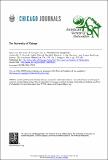Spite and the scale of competition in Pseudomonas aeruginosa
Abstract
Scale of competition has been shown to be an important factor in shaping the evolution of social interactions. Although many theoretical and experimental studies have examined its effect on altruistic cooperation, relatively little research effort has been focused on spiteful behaviors-actions that harm both the actor and the recipient. In this study, we expand on existing theory by investigating the importance of the global frequency of spiteful alleles, and we determine experimentally how the scale of competition affects selection for spite in the bacterial pathogen Pseudomonas aeruginosa under high and intermediate spatial relatedness. Consistent with our theoretical results, we found in our experiments that spiteful genotypes are more favored under local (rather than global) competition and intermediate (rather than high) spatial relatedness, conditions that have been shown to select against indiscriminate altruism.
Citation
Inglis , R F , Roberts , P G , Gardner , A & Buckling , A 2011 , ' Spite and the scale of competition in Pseudomonas aeruginosa ' , American Naturalist , vol. 178 , no. 2 , pp. 276-285 . https://doi.org/10.1086/660827
Publication
American Naturalist
Status
Peer reviewed
DOI
10.1086/660827ISSN
0003-0147Type
Journal article
Description
This work was funded by the European Research Council and the Leverhulme Trust (A.B.), the Natural Environment Research Council (R.F.I. and A.B.), and Balliol College and the Royal Society (A.G.).Collections
Items in the St Andrews Research Repository are protected by copyright, with all rights reserved, unless otherwise indicated.

